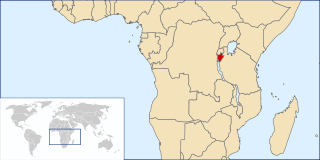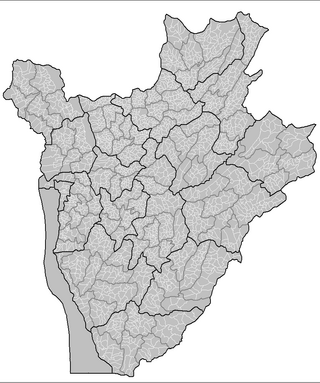
The United Nations Operation in Burundi (ONUB) was established by United Nations Security Council in May 2004 to ensure the continuation of the Arusha Peace and Reconciliation Agreement signed on 28 August 2000.

The United Nations Integrated Office in Burundi (BINUB) was established by the United Nations Security Council to support the government of Burundi in its efforts towards long-term peace and stability and to replace the work of United Nations Operation in Burundi (ONUB). Its mandate was scheduled to begin on 1 January 2007 for an initial 12 months, and its creation and mission was as a result of recommendations in a report by the secretary-general.

The following outline is provided as an overview of and topical guide to Burundi:

United Nations Security Council resolution 1040, adopted unanimously on 29 January 1996, after considering letters by the Secretary-General Boutros Boutros-Ghali and statements by the President of the Security Council, the Council addressed the civil war in Burundi and efforts for political dialogue.

United Nations Security Council resolution 1049, adopted unanimously on 5 March 1996, after reaffirming Resolution 1040 (1996) concerning Burundi, the Council called for an end to violence in the country and discussed preparations for a conference on security in the African Great Lakes region.

United Nations Security Council resolution 1072, adopted unanimously on 30 August 1996, after reaffirming all resolutions and statements by the President of the Security Council on the civil war in Burundi, the Council discussed efforts for a political settlement to the conflict in the country.

United Nations Security Council resolution 1286, adopted unanimously on 19 January 2000, after reaffirming all resolutions and statements by the President of the Security Council on the civil war in Burundi, the council supported the efforts of former South African President Nelson Mandela in reaching a political settlement to the conflict in the country.

United Nations Security Council resolution 1340, adopted unanimously on 8 February 2001, after recalling resolutions 808 (1993), 827 (1993), 1166 (1998) and 1329 (2000), the Council forwarded a list of nominees for permanent judges at the International Criminal Tribunal for the former Yugoslavia (ICTY) to the General Assembly for consideration.

United Nations Security Council resolution 1350, adopted unanimously on 27 April 2001, after recalling resolutions 808 (1993), 827 (1993), 1166 (1998) and 1329 (2000), the Council forwarded a list of nominees for permanent judges at the International Criminal Tribunal for the former Yugoslavia (ICTY) to the General Assembly for consideration.

United Nations Security Council resolution 1375, adopted unanimously on 29 October 2001, after reaffirming all resolutions and statements by the President of the Security Council on the civil war in Burundi, endorsed efforts by South Africa and other states to implement the Arusha Accords and supported the establishment of an interim multinational security presence in Burundi.

United Nations Security Council Resolution 1545, adopted unanimously on 21 May 2004, after recalling all resolutions on the situation in Burundi, particularly Resolution 1375 (2001), the council established the United Nations Operation in Burundi (ONUB) to bring about peace and national reconciliation in the country.

United Nations Security Council resolution 1577, adopted unanimously on 1 December 2004, after recalling Resolution 1545 (2004) on the situation in Burundi, the Council extended the mandate of the United Nations Operation in Burundi (ONUB) for a period of six months until 1 June 2005.

United Nations Security Council Resolution 1959, adopted unanimously on December 16, 2010, after recalling resolutions 1719 (2006), 1791 (2007), 1858 (2008) and 1902 (2009), the Council established the United Nations Office in Burundi (BNUB) to replace the United Nations Integrated Office in Burundi (BINUB) as part of a scaled-down United Nations presence in the country for an initial period of twelve months, beginning January 1, 2011.

United Nations Security Council resolution 1602, adopted unanimously on 31 May 2005, after recalling resolutions 1545 (2004), 1565 (2004), 1577 (2004) and 1596 (2005) on the situation in Burundi, the Council extended the mandate of the United Nations Operation in Burundi (ONUB) for a period of six months until 1 December 2005.

United Nations Security Council resolution 1606, adopted unanimously on 20 June 2005, after reaffirming its support for the Arusha Peace Agreement regarding the situation in Burundi, the Council requested the Secretary-General Kofi Annan to begin negotiations on a truth commission and special chamber within the country's court system.

United Nations Security Council resolution 1641, adopted unanimously on 30 November 2005, after recalling Resolution 1545 (2004) regarding the situation in Burundi, the Council extended the mandate of the United Nations Operation in Burundi until 15 January 2006.

United Nations Security Council Resolution 1650, adopted unanimously on 21 December 2005, after recalling Resolution 1545 (2004) regarding the situation in Burundi, the Council extended the mandate of the United Nations Operation in Burundi (ONUB) until 1 July 2006.

United Nations Security Council Resolution 1669, adopted unanimously on April 10, 2006, after recalling previous resolutions concerning the situation in Burundi and the Democratic Republic of the Congo, particularly Resolution 1650 (2005), the Council authorised the redeployment of personnel from the United Nations Operation in Burundi (ONUB) to the United Nations Mission in the Democratic Republic of the Congo (MONUC) until July 1, 2006.

United Nations Security Council Resolution 1692, adopted unanimously on June 30, 2006, after recalling resolutions on the situation in Burundi and the African Great Lakes region, particularly resolutions 1650 (2005) and 1669 (2006), the Council extended the mandate of the United Nations Operation in Burundi (ONUB) until December 31, 2006.

United Nations Security Council Resolution 1719, adopted unanimously on October 25, 2006, after recalling resolutions on the situation in Burundi, including resolutions 1545 (2004), 1577 (2004), 1602 (2005), 1606 (2005), 1650 (2005) and 1692 (2006), the Council established the United Nations Integrated Office in Burundi (BINUB) for an initial period of one year to assist in the country's long-term peace and stability.











